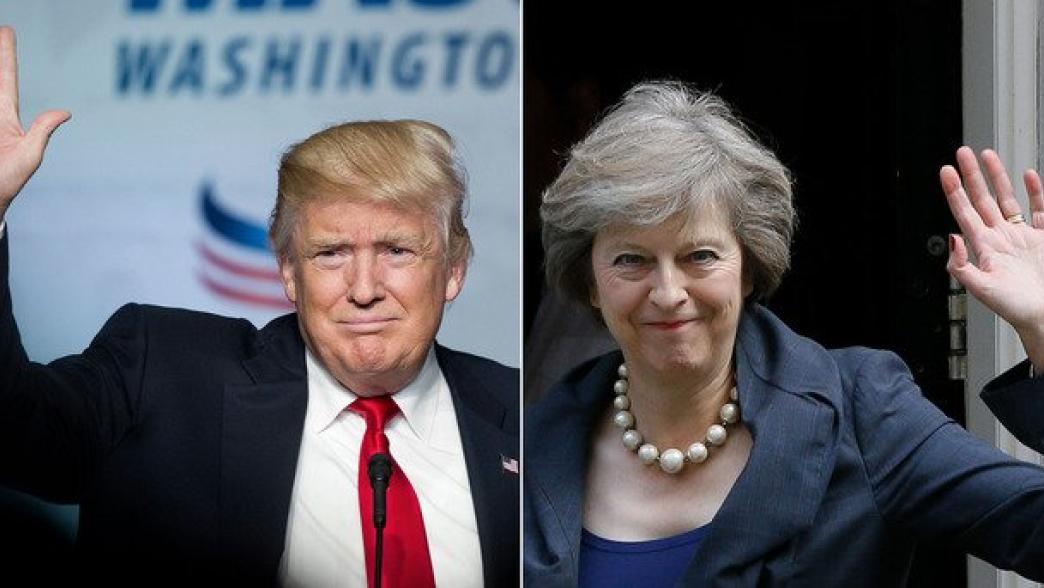
Bronwen Maddox asks if the Trump presidency could actually make Brexit easier.
As British officials scrutinise the new White House, that is one question they are turning over in their minds. In a few respects, the answer is probably yes – but that has to be weighed against the sheer uncertainty of what is now emanating from 1600 Pennsylvania Avenue.
Reams have been written on the parallels between the twin political shocks of 2016: the UK’s vote to leave the EU and the election of Donald J Trump as the 45th President of the United States. Accurately, if in retrospect, commentators have observed that the results were driven by a compound of resentment against immigration, against elites, and anger over lost jobs and stalled wages.
But from here on, parallels are less useful. Theresa May has succeeded in turning Brexit, at least at this point, into an exercise to be managed “as best we can”. There is no organised opposition either in Parliament or, despite the efforts of the Lib Dems and now Tony Blair, in the country more widely.
In contrast, the US is now wracked by the divisions that the election result represented, and whatever else Trump has managed to achieve in his first month – very little, despite his claims to the contrary. He commands the attention (if not the support) of television channels, press and social media like no other modern politician. To his opponents, he not only represents a platform of policies they detest, but in his attacks on the media (“enemies of the American people”), the intelligence services and the judiciary, he represents a threat to the constitutional checks and balances that uphold American democracy.
Can anything come out of that whirlwind that is useful to Britain in the negotiations with the European Union that are about to start? On three points, yes, although it takes a degree of generosity to regard them as solid ground.
The first is that Trump’s apparent antipathy to the European Union, expressed most clearly in his delight in Brexit, has strengthened a sense of European solidarity – that European countries need to stick together. The EU cannot rely on the US to affirm even the sense of shared values let alone that the union is a worthwhile project. So it better sort out its internal rifts. Even though Britain is leaving, it can appeal to this sense of common cause.
A second point, by extension: the value of Britain’s security contribution to Europe is even greater now that the Trump administration’s chilly contemplation of NATO and other defence alliances is clear. Despite the grudging support for NATO which Theresa May adroitly extracted from the President, the US is continuing to demand that members pay the target 2% of GDP (the US pays more than 3%, and Britain 2). Britain’s role not just within NATO but contributing to European security and immigration measures more generally is a card that the government has not yet played explicitly in EU talks, but it is clearly there all the same.
The third point is the enthusiasm of Trump to strike an early trade deal with Britain (or so it seems – a necessary caveat at this stage). Almost any comment, let alone substantial detail, that emerges to support this will strengthen Britain’s hand in beginning talks with the EU. Yet there should be a warning. For all that enthusiasm, the US will strike a tough deal on trade, and it’s already clear that some elements it will insist on will be unpalatable to the UK – literally, perhaps, in the case of accepting chlorine-washed chicken and hormone treated beef. As Britain begins to explore bilateral trade deals with other countries, agriculture will be a constant battleground – as it always is in trade deals.
As the UK government feels its way with the Trump administration, it can reach for these potential gains in helping ease the task of Brexit. But it is also no doubt well aware of the risks in the relationship. One risk is, as the proposed state visit has shown, the blowback from contact with a President who provokes such strong opposition. Others are the risk that the White House suddenly turns against policies embraced by Britain (the Iran nuclear deal is one), or makes unwanted requests for support.
While Theresa May’s determination to forge early links with Trump is reasonable given the importance of relations with the US, the volatility and nature of the policies that are emanating from the White House have raised the cost higher than was evident when she stepped onto the plane for her visit.
- Topic
- Brexit